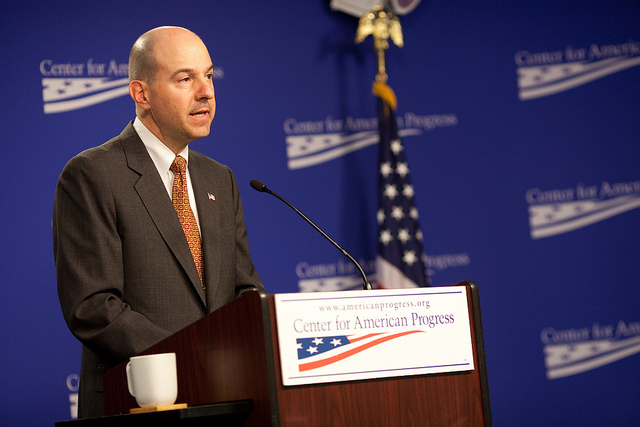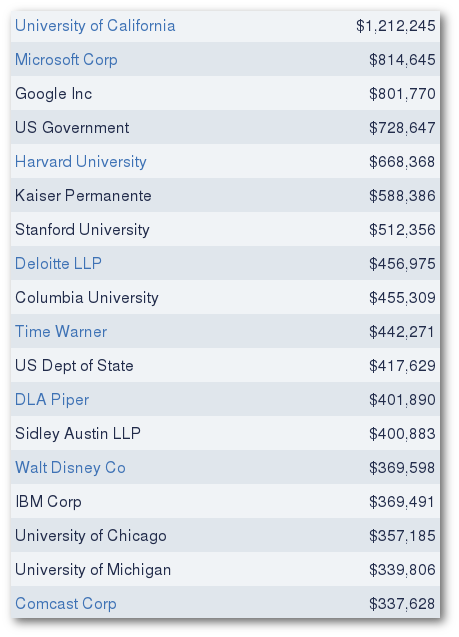10.16.14
Posted in Law, Patents at 4:21 pm by Dr. Roy Schestowitz
Summary: Another new development shows that more burden of proof is to be put on the litigant, thus discouraging the most infamous serial patent aggressors and reducing the incentive to settle with a payment out of court
THERE have been some victories recently against software patents. The patent lawyers have become either silent or rude. Well, the rude and shameless IP Watchdog is apparently upset by Steph, the patent trolls tracker who writes: “I don’t often get in fights on Twitter, but when I do, it’s with IP Watchdog because he’s a bully (only sometimes, but still) or with inventors who feel that any attempt at curbing patent trolls will adversely affect them and their ability to sue people who infringe on their ideas.”
As Pogson pointed out today, software patents are rapidly eroding in the US and last month there was an important development that Cory Doctorow draws attention to only now, spurring these remarks from Mike Masnick who wrote:
Judges Want To Make Life Harder On Patent Trolls: Want Them To Actually Have To Explain What Infringement Happened
I’d missed this one, but Cory Doctorow over at BoingBoing points our attention to the fact that, last month, the Judicial Conference voted to make a little-noticed change in patent lawsuits that should serve to make life more difficult for patent trolls. The details here are more complex than necessary, but the short version is that, under current rules, to file a patent infringement case, the initial complaint can be almost entirely bare bones: basically naming the plaintiff, defendant, patent and saying there’s infringement, but providing no real details on the infringement. That aids patent trolls, who often will file questionable lawsuits without even telling the defendant where the infringement occurs — leading defendants to have to go into the case a bit blind, and making it more appealing to just settle.
Earlier today IDG published an article by Simon Phipps. It relates to the above and days that “patent trolls have one fewer legal loophole to hide behind” (not just classic trolls, but also megatrolls like Microsoft, which often refuses to publicly disclose even patent numbers).
Things just keep getting better on this front. █
Permalink
 Send this to a friend
Send this to a friend
10.04.14
Posted in Law, Microsoft, Patents at 4:07 am by Dr. Roy Schestowitz
The rule of low, not law

Summary: The USPTO continues to lower the bar for patents’ acceptance, but on the other hand, many software patents are increasingly being rejected at the courts
Software patents may be on their way down, but patents as a whole are not going down, only their standard goes down. As a relatively benign patent lawyer put it the other day: “The fight for patent reform isn’t about trying to trample on inventors’ rights. It’s about trying to deal with the reality of thousands of bad patents and trying to prevent people from collecting money (and hindering innovation) based on patents that should never have issued.”
On another day he shed light on this troll:
And an Acacia subsidiary was ordered to pay NetApp’s legal fees after suing on patents that turned out to be licensed already.
“Software patents may be on their way down, but patents as a whole are now going down, only their standards go down.”The roundup links to this article about Acacia and it says that this “subsidiary of the patent aggregator had brought suit despite already striking a licensing deal with RPX.”
RPX is another kind of troll, but not quite the aggressive one. Here is some more coverage:
NetApp sticks biggest “patent troll” with $1.4M fee sanction
This summer, the Supreme Court made it easier for defendants to collect fees when they win patent cases. The decision is starting to have an effect—the nation’s largest patent troll just got slapped with an order to pay $1.4 million in attorneys’ fees to NetApp, which it sued in 2010.
The case brought by Summit Data Systems, a branch of Acacia Research Corp., hinged on an accusation that NetApp infringed when its server-based software interacted with an end user on a Microsoft operating system. The two patents-in-suit, 7,392,291 and 7,428,581, relate to “block-level storage access over a computer network.”
Notice the Microsoft connection. Some consider Acacia to be somewhat of a Microsoft proxy for several reasons that we covered before. This again is a software patent. This patent got defeated. Here is the EEF writing about another software patent, dubbing it “stupid patent of the month”:
Blue Spike LLC is a patent litigation factory. At one point, it filed over 45 cases in two weeks. It has sued a who’s who of technology companies, ranging from giants to startups, Adobe to Zeitera. Blue Spike claims not to be a troll, but any legitimate business it has pales in comparison to its patent litigation. It says it owns a “revolutionary technology” it refers to as “signal abstracting.” On close inspection, however, its patents turn out to be nothing more than a nebulous wish list. Blue Spike’s massive litigation campaign is a perfect example of how vague and abstract software patents tax innovation.
EFF is calling out software patents now, not just “stupid patents”.
According to some new numbers, the stupidity of patents only gets worse as it gets easier to have them granted:
Dennis Crouch over at Patently-O reports that for Fiscal Year 2014 (which just ended), the USPTO granted a record number of utility patents, over 300,000. Dennis determines that this results in an allowance rate of about 70%.
“Think about that – 70% of patent applications result in a patent,” says this article, but the real number may be 92% because some reapply until 'success'. This is ridiculous. A patent lawyers’ site says 300,000 patents got granted in one fiscal year. Good luck keeping track of so-called ‘infringements’.
Well, only recently we gave many examples of software patents being eliminated by US courts. Steven Seidenberg, writing for Intellectual Property Watch, claims that the “US [is] Cracking Down On Software Patents” and in his own words:
The US courts are aggressively applying the ruling. So is the US Patent and Trademark Office (USPTO). Thanks to their common interpretation of the US Supreme Court’s recent decision in Alice Corp. v. CLS Bank, it is now open season on software patents.
Software patents are definitely suffering a major blow right now, but the overall problem is far from over. As TechDirt put it yesterday, the USPTO‘s standards are so low that a “Design Patent Granted… On A Toothpick”. It’s not satire. The EPO is corrupt, but the USPTO may not be much better. They are not providing public service; they are a front for corporations and increasingly trolls too. █
Permalink
 Send this to a friend
Send this to a friend
09.19.14
Posted in Courtroom, Law at 3:39 pm by Dr. Roy Schestowitz

Photo from Reuters
Summary: A long series of abuses in CAFC may as well suggest that this court has become broken beyond repair
THE Court of Appeals for the Federal Circuit (CAFC), a corrupt court which brought software patents to the world some decades ago, is seriously considered rogue and some are calling for it to shut down.
Mike Masnick names another reason to shut down CAFC: “Back in 2004, when I first read the book Innovation and Its Discontents, I was convinced that the Court of Appeals for the Federal Circuit, better known as CAFC, or the “patent appeals court” was a huge part of the problem with the patent system. It was the special court that had been set up in the early 80s to handle all patent appeals, based on the totally misplaced notion that because patent issues were so technical, regular appeals courts wouldn’t be able to handle the nuances. What we got instead was a court that became “patent specialists” in that they spent much of their time with the patent bar — who tended to be lawyers who profited handsomely from an ever expanding patent law. It didn’t help that one of the original CAFC judges was Giles Rich, a former patent attorney who almost single-handedly wrote the Patent Act of 1951. Rich more or less made it his lifetime goal to expand the patent system to cover “everything under the sun made by man,” and he came close to succeeding.”
The article is titled “CAFC: The Rogue Patent Court, Captured By The Patent Bar, Needs To Go Away” and it very much reflects on what we see much of the time.
The numbers of controversies or corruption (as we have covered before) surrounding CAFC indicate that it should not be unthinkable or controversial to suggest shutdown. When is a court deemed “above the law”? █
Permalink
 Send this to a friend
Send this to a friend
08.13.14
Posted in Law, Patents at 3:04 am by Dr. Roy Schestowitz
More fraud and abuse in the monopolies-granting bodies that large corporations are utilising

Photo credit: Center for American Progress
Summary: Corruption is found at the heart of the USPTO and the USPTO works hard to hide it, despite attempt by whistleblowers to bring this corruption to light
OVER the years we have covered many issues and scandals in the USPTO. Not only the copyright system is rigged (managed by and serving the large copyright monopolies); the USPTO is more or less the same. It is a government body that is run by corporations and their minions (like David Kappos). Some months ago we showed that the USPTO was approving 92% of all applications, which makes it little more than a rubber-stamping establishment.
Well, how can it be that so much prior art and triviality got overlooked by the Kappos-run USPTO?
Perhaps now we know.
“For quite some time now, we’ve discussed how the USPTO had a massive backlog,” says Mike Masnick, “and that former boss David Kappos solved this “problem” by getting examiners to approve more patents faster, mainly by lowering their standards and granting more patents.”
“Whenever we write about this, we hear about overworked patent examiners who are really trying their best. Except, it appears that the system is actually rife with abuse and fraud by patent examiners,” Masnick added, linking to a highly-cited report.
To quote the report: “Prompted by multiple whistleblower complaints, the U.S. Patent and Trademark Office began an internal investigation two years ago of an award-winning program that’s been praised in and outside government: Employees are allowed to work from home.
“What the inquiry uncovered was alarming.
“Some of the 8,300 patent examiners, about half of whom work from home full time, repeatedly lied about the hours they were putting in, and many were receiving bonuses for work they didn’t do. And when supervisors had evidence of fraud and asked to have the employee’s computer records pulled, they were rebuffed by top agency officials, ensuring that few cheaters were disciplined, investigators found.”
Here again we see whistleblowers in action and cover-up attempts by the USPTO.
The attempted cover-up attempts show that rather than deal with the abuses the USPTO became very much complicit. Perhaps it’s time to shut down the USPTO in its current form and annul all the patents approved in the past few years, revising and reviewing them as they may never have been reviewed at all, just blindly approved. To quote Masnick: “So, we just wrote about the fact that there was apparently fairly widespread abuse and fraud by patent examiners, mostly those working from home, in lying about the hours they put in and getting paid for work they didn’t do. However, what may be much more concerning was the fact that the USPTO tried to hide this from the Inspector General who was investigating this. As the Washington Post notes, an initial internal report detailed many more examples of fraud and abuse, which disappeared from the final report that was handed over. ”
The whistleblowers at the USPTO deserve some credit and they remind us the importance of whistleblowers, who so often rely on Free software.
The CCIA's Matt Levy now admits in his belated disclosure that “my wife is a patent examiner who teleworks.” Teleworking has been the source of abuse, but Levy keeps chastising “The PTO’s Culture of Poor Quality Patents” rather than corruption.
“The problem,” he says, “is not simply a bunch of crooked people trying to get away with something. There is clearly a cultural problem at the USPTO.”
No, the problem is that the USPTO — just like CCIA — is serving corporations. It does not serve public interests. Patent scope is one of the symptoms.
We currently talk to someone who wishes to blow the whistle on the EPO but it trying to set up encryption. It is clear that the NSA and its partners in Europe have done a lot to deter whistleblowers. █
Permalink
 Send this to a friend
Send this to a friend
07.18.14
Posted in Law, Patents at 3:03 pm by Dr. Roy Schestowitz
There are software patents even on progress bars

Summary: The Federal Circuit Appeals Court has just “invalidated a software patent for being overly abstract,” says a patents expert
Some days ago we noted that the USPTO had begun rejecting software patents owing to a SCOTUS decision. Thankfully, the subject of software patents is back in the headlines (not “trolls”), with articles like “Kickstarting an Old Patent System for the New Software Era”. More fantastic news from the US (regarding software patents) seemed to suggest that the tide is changing, as CAFC — not just the USPTO — destroys software patents (both CAFC and USPTO the are software patents maximalists). Here is some new coverage of it:
On Friday we got our first taste of the practical consequences of last month’s landmark decision from the Supreme Court restricting patents on software. The Federal Circuit Appeals Court, which hears appeals in all patent cases, invalidated a software patent for being overly abstract. And the reasoning of the decision could lead to a lot of other software patents going down in flames, too.
This is exciting news. Some of the most pro-software patents entities are now forced to obey the guidance from SCOTUS. This is a real change and one that the corporate media has not been covering. After the Bilski ruling we saw something similar. █
Permalink
 Send this to a friend
Send this to a friend
07.14.14
Posted in Apple, Law, Patents at 5:36 am by Dr. Roy Schestowitz

Obama’s top contributors in 2012 election. Source: opensecrets.org
Summary: Philip Johnson is no longer poised to become the Director of the USPTO, which is basically an establishment that provides protectionism to primarily US-based corporations
THE USPTO, like much of the US government, is effectively run by corporations that fund it (campaign ‘contributions’, patent applications, and so on). We previously showed how Apple had been receiving special treatment from the USPTO and other pseudo-Federal branches of government. It’s all protectionism. Money calls the shots.
The other day The Mukt covered “Apple fil[ing] Auto-Unlock Patent although already available on Android” and since the USPTO has been approving almost all applications (92% of them) irrespective of prior art and quality, this too might pass. It’s just Apple’s arrogance, pretending that it invented everything under the Sun when it in fact imitates a lot of companies, as Steve Jobs himself once admitted to the camera.“Early Apple Employees Said They Would Never Work With Steve Jobs Again” is a new article that should be read by Apple fans, reminding them or even teaching them that Jobs is more of a con artist than an artist.
Now, given the inherent corruption in the USPTO (serving corporations, not public interests) we were not too shocked to see Philip Johnson almost becoming its new head. It’s the outcry from some corporations — not from the public — that must have stopped his appointment. It’s corporations that still call all the shots and some hypothesise that resistance to him came from the technology/high-tech sector as opposed to pharmaceutical giants. They vote with their money in the White House (e.g. withdrawing funds or bribing politicians under the guise of campaign ‘contributions’). Previously, a man from IBM, David Kappos, ran the USPTO and unsurprisingly promoted software patents (IBM lobbies for them even in Europe and New Zealand).
Kamdar from the EFF says why Philip Johnson oughtn’t have been nominated for USPTO Director:
Philip Johnson is Chief Intellectual Property Counsel of Johnson & Johnson, one of the largest pharmaceutical companies in the world. He is also a representative member of the Coalition for 21st Century Patent Reform, the leading trade group opposing patent reform this past year.
And now he’s rumored to be next in line to be the director of the United States Patent and Trademark Office.
[...]
What we need is someone who understands the problems with patent law, especially when it comes to software patents. Some are pointing to the fact that David Kappos, the previous director of the Patent Office, was from the tech industry, so the next one has to come from pharma or biotech. This push does a great job of highlighting the fact that one single patent system shouldn’t apply to technologies as different as pharmaceuticals and software. In any event, the nominee to head the Patent Office shouldn’t be the face of opposition to patent reform that was championed by the White House, passed by a majority of the House, and supported by a considerable proportion of Senators.
Thankfully, as Ars Technica put it, “The White House has reportedly put its chosen nomination for head of the US Patent and Trademark Office on ice.”
The Mukt called Philip Johnson “patent extremist” and added: “The Obama administration was about to repeat the mistake it made by picking Tom Wheeler as the head of FCC. The administration was planning to hand over USPTO to Phil Johnson, a Johnson & Johnson executive who is a strong opponent of any patent reform in the country. Johnson actually played a pivotal role in the death of the patent reform bill this May.”
We still don’t know who will fill the seat formerly occupied by the software patents booster. Just because one patent extremist is not approved by the White House does not mean that a different patent extremist can’t take this place. We need to keep watching and praising/criticising, as appropriate, the decisions made by the White House. Corporations that sank billions of dollars in campaign ‘contributions’ (bribes) have a much louder voice than ours (collectively). They also get privileged access into private meetings in the White House, offering their ‘consultation’ (lobbying). █
Permalink
 Send this to a friend
Send this to a friend
Posted in Law, Patents at 5:01 am by Dr. Roy Schestowitz

Summary: The debate about software patents in the Unites States continues, with academia on one side and greedy patent lawyers on the other
Vox has published a new article titled “The case against software patents, in 9 charts”. It was authored by James Bessen, a professor widely known for his well-researched publications which show that software patents are bad (for the economy, for science, and just about everything except patent lawyers and monopolies or trolls). Recently, the decision from SCOTUS led patent lawyers to deep denial, trying to pretend that nothing has changed and that software patents are as valid as before. These so-called ‘law’ firms have their own agenda. The Webb Law Firm wrote: “Alice Corp. v. CLS Bank International [PDF] is the last of several patent law cases decided by the US Supreme Court in its October 2013 term. While the decision has generated considerable speculation questioning the future of “software patents,” conclusions on the scope of patent-eligible subject matter will have to wait.”
Wait for who? Lawyers?
Moritt Hock & Hamroff, another so-called ‘law’ (technology monetisation by bureaucracy) firm wrote: “Patent eligibility, up until a few years ago, was even easier. Basically, anything new under the sun made by man (or woman) was patentable. That has now changed. Eligibility excludes from patent protection some obvious exceptions such as laws of nature and mathematical ideas. For example, you can’t get a patent on Maxwell’s equations. How would you enforce such a patent? But you can get a patent on a new application of Maxwell’s equations. A less-developed exception to patent eligibility is the concept of an “abstract idea.” Such abstract ideas are not patentable. Here’s the problem, what is “abstract”? What test do we use to determine whether an invention is an abstract idea? And what level of abstraction do we look at?”
This seems like a more rational analysis than the previous one. Here is an analysis from lawyers who alluded to the European law. To quote a fraction:
It is not possible to obtain a patent in Europe for a program for a computer “to the extent that a patent or application for a patent relates to that thing as such”. In the United States, however, that has not been the case and this has proven a fruitful source of dispute in the Courts. This may be about to change.
The danger is that patent trolls from the United States (and especially from Texas where Daniel Nazer says they like to hang out in for patents [1] if not other ludicrous causes [2,3]) will one day land in Europe, due to a sort of unification of patent laws. Right now we can only hope that the US will work to eliminate software patents for good, pushing back against a European trend of gradually legitimising such patents. █
Related/contextual items from the news:
-
There is a lot in our current patent system that is in need of reform. The Patent Office is too lax in granting patents. Federal Circuit case law has consistently favored patentees. Another part of this problem is the forum shopping by patentees that leads to a disproportionate number of cases being filed in the Eastern District of Texas.
Back in 2011, This American Life did a one-hour feature called “When Patents Attack!” The story included a tour of ghostly offices in Marshall, Texas, where shell companies have fake headquarters with no real employees. For many people, it was their first introduction to the phenomenon that is the Eastern District of Texas, a largely rural federal court district that has somehow attracted a huge volume of high-tech patent litigation.
-
A Texas lawyer intent on shutting down Pink Meth, a site known for facilitating revenge-porn, has named the Tor Project in a lawsuit claiming at least $1 million in damages. The inclusion of Tor apparently was based on a statement on Pink Meth’s site that thanks the project for enabling users’ anonymity. “Once we verify that they’re not helping Pink Meth, we will dismiss them,” the lawyer said.
-
Tor, which offers encrypted software and an open network of protected communications, has been sued in the state of Texas over a revenge porn website that used its free service.
Permalink
 Send this to a friend
Send this to a friend
07.03.14
Posted in Free/Libre Software, Law at 11:24 am by Dr. Roy Schestowitz
“My background is finance and accounting. As a socially conscious venture capitalist and philanthropist, I have a very good understanding of wealth management and philanthropy. I started my career in 1967 with the IRS as a specialist in taxation covering many areas of the tax law including the so-called legal loopholes to charitable giving. […] However, the Gates Buffet foundation grant is nothing more than a shell game in which control of assets for both Gates and Buffet remain the same. […] The only difference is that the accumulation of wealth by these two will be much more massive because they will no longer have to pay any taxes.”
The Gates and Buffet Foundation Shell Game
Summary: The Yorba Foundation is denied tax exemptions while the world’s biggest thief, who increases his wealth by lobbying and investing under the guise of ‘charity’, receives tax exemptions
THIS is a major story that, unlike some stories (e.g. the No-IP takeover scandal which we’ll cover soon), has not received sufficient press coverage. The other day in our daily links we included a link that my wife had found and was made rather furious by. We linked to the original just hours after it was published (in June) and it took days until some sites — small sites — covered it very briefly. Susan Linton said: “The top story in today’s Linux news is the IRS denial of nonprofit status for Open Source projects.”
This was hardly the top story. It didn’t receive much attention and it took days for it to get any press coverage at all. Here is what Boing Boing wrote only yesterday:
In a disturbing precedent, the Yorba Foundation, which makes apps for GNU/Linux, has had its nonprofit status application rejected by the IRS because some of projects may benefit for-profit entities.
Will Hill said that there is “[a]n interesting comment from a lawyer on the pluss“:
If ICANN can be a 501(c)(3), and pull in around $400,000,000 in 2013 while benefiting pretty much every intellectual property protection agent in the world, I don’t see how someone who produces code that they give away for free can be refused similar status.
Thankfully, this issue has been getting some more coverage in some technology news sites very recently [1,2], but nothing else as far as we can tell. Apparently it’s OK for an investment and Microsoft lobbying body to get tax exemptions (that’s Gates Foundation), but it is not okay for a bunch of programmers who work without a salary to receive tax-free donations. This is how US ‘justice’ works, apparently. Rich people pay next to nothing to their government and diligent poor people are portrayed as some kind of “parasites” and forced to pay part of the meager donations they receive to the government. █
Related/contextual items from the news:
-
Last year, as the IRS scandal blossomed over the IRS supposedly targeting “conservative” groups for extra attention concerning their non-profit status, we noted that the IRS had also been told to examine “open source software” projects more closely as well. We found that to be a bit disturbing — and it appears that for all that focus on the scandal, the IRS hasn’t quite given up on unfairly targeting open source projects. The Yorba Foundation, which makes a number of Linux apps for GNOME, has been trying to get declared a 501(c)(3) non-profit for over four years now… and just had that request rejected by the IRS for reasons that don’t make any sense at all. Basically, the IRS appears to argue that because there might be some “non-charitable” uses of the software, the Foundation doesn’t deserve non-profit status, which would make it exempt from certain taxes (and make donations tax deductible).
-
The IRS denied a proposal to grant 501(c)(3) status to Yorba, a nonprofit organization that develops open source software for the Linux desktop. In a blog post yesterday, Yorba spokesperson Jim Nelson disclosed the full text of the IRS rejection letter. He fears that IRS policy has evolved to broadly preclude nonprofit open source software developers from obtaining 501(c)(3) tax exemptions.
Permalink
 Send this to a friend
Send this to a friend
« Previous Page — « Previous entries « Previous Page · Next Page » Next entries » — Next Page »























 Content is available under CC-BY-SA
Content is available under CC-BY-SA